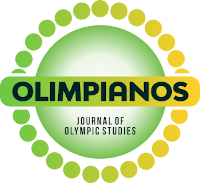The approach of the Olympic movement to new times: the case of migratory flows and the Olympic Refugee Team
DOI:
https://doi.org/10.30937/2526-6314.v6.id142Keywords:
Olympic Movement, Olympic Refugee Team, migratory flowsAbstract
Seeking once again to approach society's demands, the International Olympic Committee uses the Olympic Agenda 20+20 as a resource to talk to the international community and face the challenges of the coming years. An ambitious initiative approved by the IOC Executive Committee in 2014, the Olympic Agenda 20+20 aims to strengthen the role of sport in society and bring it closer to the agendas that have been debated in this 21st century. One of these themes is the issue of refuge and migratory flows. With 82.4 million refugees around the world, according to the United Nations High Commission for Refugees, the IOC, through the Olympic Solidarity program and the Olympic Refugee Team, aims to support athletes in these conditions, guaranteeing these people the right to practice sports , as seen in the Olympic editions of Rio-2016 and Tokyo-2020. This brief article seeks to analyze how the IOC, even though it is an entity with an aristocratic and Eurocentric profile, manages to maintain its international prestige through its historic diplomatic skills and the importance that the Olympic Games represent.
Downloads
References
Comitê Olímpico Internacional. Olympic Agenda 2020 - Closing Report. Lausanne: COI; 2014.
Del Vecchio V, Sorde V. O papel do esporte olímpico na inclusão dos refugiados [citado 17 jun 2022]. Folha de S. Paulo; 2021. Disponível em: https://www1.folha.uol.com.br/esporte/2021/06/o-papel-do-esporte-olimpico-na-inclusao-dos-refugiados.shtml
Comitê Olímpico Internacional. Olympic Agenda 2020+5 - 15 Recommendations. Lausanne: COI; 2021.
Rubio K. Agenda 20+20 e o fim de um ciclo para o Movimento Olímpico Internacional. Revista USP. 2016;108:21-28.
Rosina D, Veloso R. Heróis nacionais: entre a figura do herói e a representação nacional nos Jogos Olímpicos. In: Rubio K(ed.). Do pós ao neo olimpismo: esporte e movimento olímpico no século XXI. São Paulo: Laços; 2019. p. 61-73.
Almeida W, Rubio K. Internationalism and the first editions of the Modern Olympics. International Sports Studies. 2018;40:34-46
Department of Economic and Social Affairs. International Migration 2020 Highlights [citado 17 jun 2022]. 2021. Disponível em https://www.un.org/development/desa/pd/news/international-migration-2020.
Mello PC. O novo mundo dos estrangeiros pré-fabricados. In: Fronteiras: territórios da literatura e da geopolítica. Porto Alegre: Dublinense; 2019. p.15-29.
Santos BS, Meneses MP. Epistemologias do Sul. Coimbra: Edições Almedina; 2009.
Harari YN. 21 lições para o século 21. São Paulo: Companhia das Letras; 2018.
Sayad A. A imigração ou os paradoxos da alteridade. São Paulo: EdUSP; 1998.
Monaco GFC, Nicolau J. Nacionalidade, imigração e esporte. In: Rubio K (ed). Do pós ao neo olimpismo: esporte e movimento olímpico no século XXI. São Paulo: Laços; 2019. p.87-107.
Fenton S. Etnicidade. Lisboa: Instituto Piaget; 2003.
Mello B. Olimpíada: imigração marca trajetória de um a cada três medalhistas de ouro no atletismo em Tóquio [citado 17 jun 2022]. O Globo; 2021. Disponível em https://oglobo.globo.com/esportes/toquio-2020/olimpiada-imigracao-marca-trajetoria-de-um-cada-tres-medalhistas-de-ouro-no-atletismo-em-toquio-1-25142490#:~:text=Tr%C3%AAs%20medalhistas%20de%20ouro%20em,a%20bandeira%20de%20suas%20m%C3%A3es.
Camilo JAO. Migração, identidade e trabalho no contexto do esporte de alto-rendimento. In: Rubio K (ed.). Do pós ao neo olimpismo: esporte e movimento olímpico no século XXI. São Paulo: Laços; 2019. p.109-118.
Elias N, Dunning E. A busca da excitação. Lisboa: Difel; 1992.
Almeida MAB, Gutierrez G. Esporte e sociedade. Lecturas Educación Física y Deportes. 2009;133:1.
SILVA, G. J; CAVALCANTI, L; OLIVEIRA, T; COSTA, L. F. L; MACEDO, M. Refúgio em Números, 6ª Edição.
Observatório das Migrações Internacionais. Ministério da Justiça e Segurança Pública/ Comitê Nacional para os Refugiados. Brasília, DF: OBMigra; 2021.
United Nations High Comissioner for Refugees. Convention and Protocol: relating to the status of refugees. Geneva: UNHCR Communications and Public Information Service; 2010.
Bauman Z. Tempos líquidos. Rio de Janeiro: Zahar; 2007.
Trigo LGG, Freitas GSP. O futebol como instrumento político na crise migratória na Alemanha e na Europa. Fênix - Revista de História e Estudos Culturais. 2017;14:1-15.
Comitê Olímpico Internacional. Team of Refugee Olympic Athletes (ROA) created by the IOC. Lausanne: COI, 2016.
Comitê Olímpico Internacional. IOC Refugee Olympic Team. Lausanne: COI, 2020.
Comitê Olímpico Internacional. IOC Refugee Olympic Team Rio 2016. Lausanne: COI, 2016.
Anderson B. Comunidades imaginadas: Reflexões sobre a origem e a difusão do nacionalismo. São Paulo: Companhia das Letras; 2008.
Neto SRS. Os atletas refugiados para além das histórias de superação [citado 17 jun 2022]. Com Ciência; 2020. Disponível em https://www.comciencia.br/os-atletas-refugiados-para-alem-das-historias-de-superacao/
Almeida WD. Equipe Olímpica de Refugiados: diálogos entre migração e esporte. 2021 World Congress of Sociology of Sport. Book of Abstracts. ISSA, 2021. 70-71.
The World Bank. Millions on the Move in Their Own Countries: The Human Face of Climate Change [citado 17 jun 2022]. The World Bank, 2021. Disponível em https://www.worldbank.org/en/news/feature/2021/09/13/millions-on-the-move-in-their-own-countries-the-human-face-of-climate-change
Marques RFR, Almeida MAB, Gutierrez GL. Esporte: um fenômeno heterogêneo: estudo sobre o esporte e suas manifestações na sociedade contemporânea. Movimento. 2007;13:225-242.
Palmer, D. IOC outlines gender equality targets for Paris 2024 [citado 17 jun 2022]. Inside the Games, 2021. Disponível em https://www.insidethegames.biz/articles/1109911/paris-2024-gender-equality-ioc#:~:text=A%20pledge%20to%20achieve%20athlete,cent%20female%20athletes%20%2D%20was%20reaffirmed.
Almeida WD, Rubio K. Nacionalidad deportiva versus nacionalidad estatal: el desafío de los atletas transnacionales en un mundo global. Educación Física y Deporte. 2020;39(1):1.
Woodward K. Identidade e diferença: uma introdução teórica e conceitual. In: Silva TT (Org.). Identidade e diferença: a perspectiva dos Estudos Culturais. Petrópolis: Vozes; 2014. p.7-72.
Bauman Z. Identidade: entrevista a Benedetto Vecchi. Rio de Janeiro: Zahar; 2005.
Hall S. Da diáspora: identidades e mediações culturais. Belo Horizonte: Editora UFMG; 2003.
Downloads
Published
Issue
Section
License
The authors authorize others to copy and redistribute the material in any medium or format. Remix, transform, and create from the material. You may not use the material for commercial purposes.






